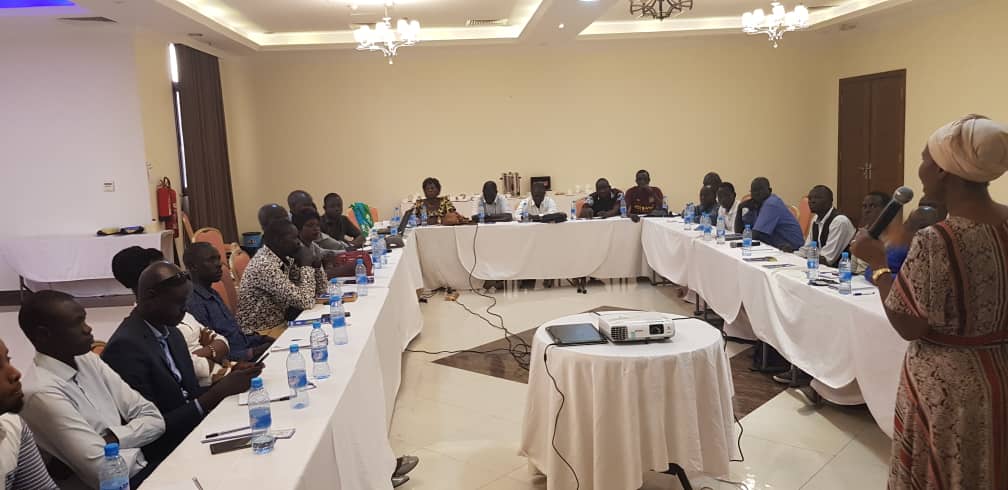
South Sudan Private Sector and Civil Society sensitized on opportunities and benefits of EAC integration agenda
East African Community Headquarters, Arusha, 12th June, 2019: A two-day training and sensitisation workshop for private sector and civil society on the opportunities and benefits of regional integration was held on 4th to 5th June, 2019, in Juba, the Republic of South Sudan (RSS).
The training and sensitisation workshop was jointly organized by the South Sudan’s Ministry of Trade, Industry and EAC Affairs; the EAC Secretariat; and the GIZ-EAC Programme, within the framework of the approved EAC Consultative Dialogue Framework (CDF).
Addressing the participants, the EAC Secretary General, Amb. Liberat Mfumukeko commended the Government of South Sudan for the steps it was taking to restore peace as the cornerstone of growth and stability and the continuing implementation of its commitments in the accession Treaty.
The Secretary General, who was represented by the Principal Gender and Community Development Officer, Ms. Generose Minani, noted that private sector and civil society operations can only be meaningfully anchored on predictable stability and policy consistency at the social, economic, and political levels.
He appreciated the cooperation programmes that EAC is implementing with the support of GIZ in South Sudan in line with the roadmap to fast track the new Partner State’s integration into the EAC. He noted that the implementation of the projects and programmes focusing on building capacities of the PSO’s and the CSO’s to enable their effective regional engagement were prioritized in the forgoing roadmap.
He called on the stakeholders to take advantage of the information shared at the workshop to build their capacities and skills so as to be able to effectively engage and benefit from the opportunities available in the region and build lasting partnerships with their counterparts in the wider EAC.
On her part, the representative from the Ministry of Trade, Industry and EAC Affairs of South Sudan, Ms. Robina Gune underscored the commitment and motivation of the stakeholders in RSS and their readiness to push forward the integration agenda and take advantage of the available opportunities.
The Ministry official noted that although RSS was still behind in many areas of integration, the Ministry, Private Sector Organizations (PSOs) and the Civil Society Organizations (CSOs) in the country were committed towards developing the necessary implementation structures and consolidating the required synergies and capacities to implement the EAC Consultative Dialogue Framework.
She called on the PSOs and CSOs to engage the Ministry on the critical support and platforms that the latter should put in place to ensure the implementation of the CDF in RSS to enhance the realisation of a people centred and market driven cooperation with the expected benefits to the citizenry.
Ms. Robina Gune applauded the EAC Secretariat, GIZ - EAC programme for the support in building capacity of the private sector and civil society in RSS on the benefits and opportunities of the EAC integration.
At the same occasion, the Cluster Coordinator of the EAC-GIZ programme, Dr. Focken Kirsten said GIZ-EAC Programme prides itself to be associated with the workshop, which was part of a series of activities that it is supporting the EAC in sensitising, building capacity and elevating the profile of the private sector and the civil society in RSS in order for these two sectors to play a lead role in securing the benefits and opportunities of the integration.
Dr. Focken noted that the EAC regional integration benefits transcend trade, economic development, democratisation, gender development and inclusion of people with disabilities and youth, peace building, investments, infrastructure development, health and human rights, among others, for citizens of EAC including South Sudan’s CSOs and PSOs that can only be realized when these stakeholders are meaningfully engaged.
The EAC sensitization workshop; whose objective was to share information, impart skills, and capacitate the stakeholders in the two sectors to benefit from regional integration of RSS into the EAC; concluded with recommendations on the need for:
- focused workshops for related clusters of the civil society and private sector associations in RSS;
- availability of simplified documentations on the projects and programmes of the Community and their implementation frameworks in RSS;
- seeking opportunities for attachments in the EAC for RSS focal persons in the apex associations should be explored;
- mobilisation of resources to train trainers to sustain the training momentum in RSS for the CSOs and PSOs and learning visits in the region for benchmarking;
- financial and technical support to the Ministry responsible for EAC Affairs to implement the CDF Framework and create the dialogue framework in RSS for the PSOs and CSOs.
-ENDS-
For more information, please contact:
Mr Owora Richard Othieno
Head, Corporate Communications and Public Affairs Department
EAC Secretariat
Arusha, Tanzania
Tel: +255 784 835021
Email: OOthieno [at] eachq.org
About the East African Community Secretariat:
The East African Community (EAC) is a regional intergovernmental organisation of six Partner States, comprising Burundi, Kenya, Rwanda, South Sudan, Tanzania and Uganda, with its headquarters in Arusha, Tanzania.
The EAC Secretariat is ISO 9001:2008 Certified
